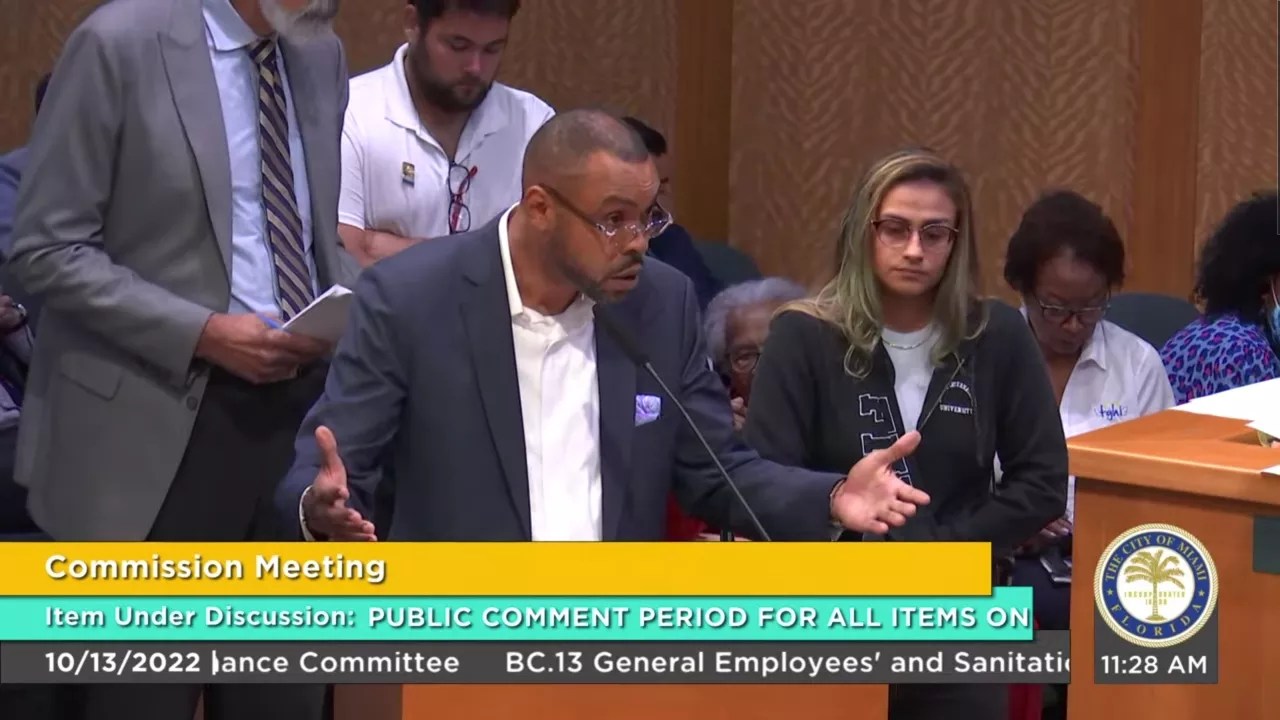
Screenshot from City of Miami via YouTube

Audio By Carbonatix
Dozens of speakers from Miami’s Black community and beyond gathered in the City of Miami Commission chambers on October 13 to stand up against the commission’s takeover of the trust that manages Miami’s historically Black beach on Virginia Key.
The leadership of the South Dade branch of the NAACP, members of the Virginia Key Beach Park Trust, and 95-year-old Black community leader Thelma Gibson came together to try to stop the majority-Hispanic commission from prying control of the trust from the majority-Black board of trustees.
“I’m hoping and praying that this commission will reconsider taking over the trust. Let us feel like we have something that we have control of,” said Gibson, who served as an interim Miami City Commissioner in 1997.
Despite hours of public comment from community members pleading to keep the current board of trustees, commissioners voted 4-1 in their afternoon session to install themselves on the board for the next year.
The sole dissenting vote on the ordinance was Commissioner Ken Russell, who said he would have supported the measure if it had given commissioners the option to appoint someone to the board in their stead. City Attorney Victoria Mendez asserted that the commissioners couldn’t choose to appoint while also sitting on the board, arguing that it would violate Florida law against dual officeholding.
Though Commissioners Alex Diaz de la Portilla and Manolo Reyes had initially agreed with Russell and wanted a second legal opinion, Commissioner Joe Carollo pushed to accept the item as is, ultimately winning out.
The conflict over the Virginia Key Beach Park Trust comes on the heels of a recent audit report that claimed the board of trustees had lackluster accounting and failed to properly document expenses.
Diaz de la Portilla made comments before the audit was made public that the board was guilty of malfeasance and was caught with “their hand in the cookie jar.” Once the audit was finalized, it presented no evidence of theft or misappropriation of trust funds.
N. Patrick Range, current trust chair and grandson of founding chair M. Athalie Range, demanded an apology from the commission for what he called “slanderous” comments made about his board members.
“To stand here as a volunteer and be impugned in the way that we were without evidence was unfair and unjust, and should not have happened,” Range said.
Diaz de la Portilla was absent from the meeting during the public comment period and did not come to his seat until the speakers were done.
In the months leading up to the ouster, Range had publicly opposed commissioners’ plans for Virginia Key, namely a move to house homeless people on the island, which was backed by Carollo and Diaz de la Portilla. In July, Range decried the city commission’s failure to consult with the trust about the matter.
The few speakers who came out yesterday to support the commission takeover of the trust were leaders from the Martin Luther King Economic Development Corporation, which Commissioner Christine King led for ten years before she took office.
Amina McNeil, current head of the corporation, supported King’s new role as chairwoman of the Virginia Key Beach Park Trust, saying King would put the concerns of the community first and help the board move in the correct direction.
Commissioner Reyes insisted that the commission would not take away from the beach park’s history as a Black landmark.
“No one is taking Virginia Key from anybody,” Reyes said from the dais. “I want to assure you that you can go home and be sure that history is not going to be rewritten.”
Virginia Key Beach Park was the first beach set aside for Black Miamians during the segregation era. Dade County opened the park in 1945 in response to protests by Black residents at whites-only beaches.
After taking over the land from the county, the City of Miami closed the park in 1982, and the historical site was overtaken by the elements. The Virginia Key Beach Park Trust, established by the city commission in December 2000, oversaw the restoration of the beach until it reopened in February 2008.
At this week’s commission meeting, many of the speakers who opposed the new plan for the park talked of the importance of preserving Miami’s Black history, the role that Black Bahamians played in building out the city, and the value of keeping the management of a historically Black beach in the hands of Black Miamians.
“To eliminate the oversight of a majority-Black board and give it to the commission, which is majority-Hispanic and has a whole lot of other things to do, is a tragedy for the Black community,” Teri Williams, president of OneUnited Bank, tells New Times during the meeting’s recess. “It’s just tone deaf.”
Williams shared a letter with the commission, signed by numerous Black clergy and business leaders, asking them to back off on taking over “this historic and sacred place in our community.” (A PDF of the letter is attached to the end of this article.)
Despite Thursday’s vote to replace the current trust board, Range said he and his colleagues will still be around to assist the city in creating a Black history museum in the park, a project that has been a goal of the trust for nearly 20 years.
“Remove us or don’t remove us, we will be here. I promise you that,” Range told commissioners.